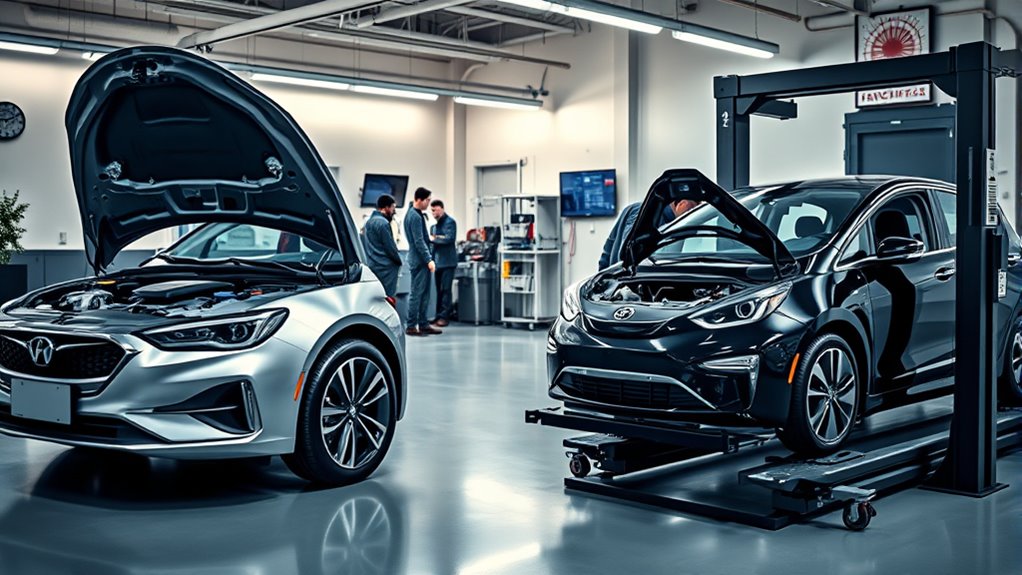When comparing hybrid and EV maintenance costs, hybrids usually cost less over time thanks to smaller batteries that last longer and fewer repairs on their internal combustion engines. EVs have bigger batteries that can be pricey to replace but tend to need less routine maintenance overall due to fewer moving parts. Charging infrastructure availability and climate also influence expenses. To discover which option suits your needs best, explore the detailed differences further.
Key Takeaways
- Hybrids typically have lower maintenance costs due to smaller batteries and less reliance on external charging infrastructure.
- EVs usually offer lower ongoing maintenance because of fewer moving parts and electric motor simplicity.
- Battery replacement costs are higher for EVs, though advances are reducing these expenses over time.
- Hybrids require less frequent fluid changes and engine tune-ups compared to traditional vehicles.
- Charging infrastructure reliability impacts EV maintenance costs, whereas hybrids are unaffected by charging station availability.

Are hybrid and electric vehicles truly different when it comes to maintenance costs? The answer depends on several factors, but one of the most significant is battery longevity. Hybrids combine a traditional internal combustion engine with an electric motor, which means their batteries tend to be smaller and generally have a longer lifespan compared to fully electric vehicles. EV batteries, on the other hand, are larger and can wear out over time, often needing replacement after about 8 to 15 years depending on usage and climate conditions. This potential battery replacement cost can be a concern for EV owners, although advancements in battery technology are helping to extend longevity and reduce costs. When it comes to maintenance, hybrids usually require less attention to their batteries because they’re not relied upon solely for propulsion, which can translate into lower long-term expenses.
Another key aspect affecting maintenance costs is the charging infrastructure. Electric vehicles depend heavily on a robust and accessible charging network. If you live somewhere with a well-developed charging infrastructure, owning an EV becomes more convenient and cost-effective, with fewer trips to service centers for fuel-related issues. However, if charging stations are sparse or unreliable, you might face additional costs and inconvenience, potentially impacting overall maintenance costs indirectly. Hybrids don’t rely on charging infrastructure in the same way since they can recharge through regenerative braking and their internal combustion engine. This flexibility means you’re less dependent on external charging stations, reducing worries about infrastructure failures or scarcity and possibly lowering maintenance costs linked to charging-related issues.
In terms of routine maintenance, hybrids generally have fewer fluid changes and engine tune-ups because the internal combustion engine runs less often. Their electric motor and battery system are more straightforward compared to traditional engines, which reduces the likelihood of costly repairs. EVs, having fewer moving parts—no oil changes, spark plugs, or timing belts—are often cheaper to maintain overall. Still, the battery is a critical component; if it fails prematurely, replacing it can be expensive, although warranties and improving battery tech are helping mitigate this concern. Additionally, top mattress toppers and other comfort solutions are increasingly considered by owners seeking to improve their overall vehicle experience, especially in long-term ownership scenarios.
Frequently Asked Questions
How Do Battery Warranties Differ Between Hybrids and EVS?
You’ll find that battery warranties differ between hybrids and EVs, mainly in duration and coverage. EVs typically offer longer warranties, often around 8 years or 100,000 miles, reflecting their larger, more durable batteries. Hybrids usually have shorter warranties, around 8 years or 100,000 miles, but their smaller batteries mean less concern about durability. Always check the warranty coverage to understand what’s protected and for how long.
Are Hybrid and EV Maintenance Costs Affected by Regional Electricity Prices?
Regional electricity prices can markedly impact your maintenance expenses for EVs, as charging costs vary by location. Lower electricity rates reduce your overall fueling costs, making EV maintenance more affordable over time. Hybrids, which rely less on grid electricity, are less affected by regional electricity price fluctuations. So, if you live in an area with high electricity rates, expect higher EV maintenance expenses, especially related to charging.
What Are the Environmental Impacts of Hybrid Versus EV Maintenance?
You might think hybrids are more environmentally friendly, but EV maintenance actually offers greater emissions reduction. EV batteries, when recycled properly, reduce harmful waste and conserve resources, lowering environmental impact. Hybrid maintenance involves more complex components and frequent repairs, generating more emissions. By choosing an EV, you support sustainable battery recycling and lessen overall pollution, making it a smarter choice for the planet.
How Does Driving Habits Influence Maintenance Costs for Hybrids and EVS?
Your driving style markedly impacts maintenance costs for hybrids and EVs. Aggressive driving can increase wear on batteries and brakes, leading to higher maintenance frequency. Smooth accelerations and decelerations reduce strain on components, lowering costs over time. For hybrids, cautious driving minimizes engine and transmission wear. In EVs, gentle driving preserves battery health. Overall, adapting your driving habits helps control maintenance expenses, keeping your vehicle running efficiently longer.
What Are the Long-Term Resale Values Considering Maintenance Expenses?
You’ll find that long-term resale values, influenced by battery depreciation and resale pricing, vary between hybrids and EVs. As EV batteries age, their depreciation impacts resale value more markedly, often lowering resale pricing. Hybrid models tend to retain value better due to less battery concern. So, if you plan to sell later, consider how battery longevity affects resale, knowing that maintenance expenses and battery health directly influence your vehicle’s future worth.
Conclusion
In the end, understanding the maintenance costs of hybrids versus EVs helps you make smarter decisions. While hybrids might seem more budget-friendly upfront, EVs often have fewer moving parts and lower upkeep. Don’t forget, it’s all about weighing the pros and cons and finding what fits your lifestyle best. Remember, sometimes you’ve gotta look beyond the surface to see the whole picture—otherwise, you might miss the boat. Choose wisely and drive confidently!









